- Details
- Category: Senator Andy Manar News
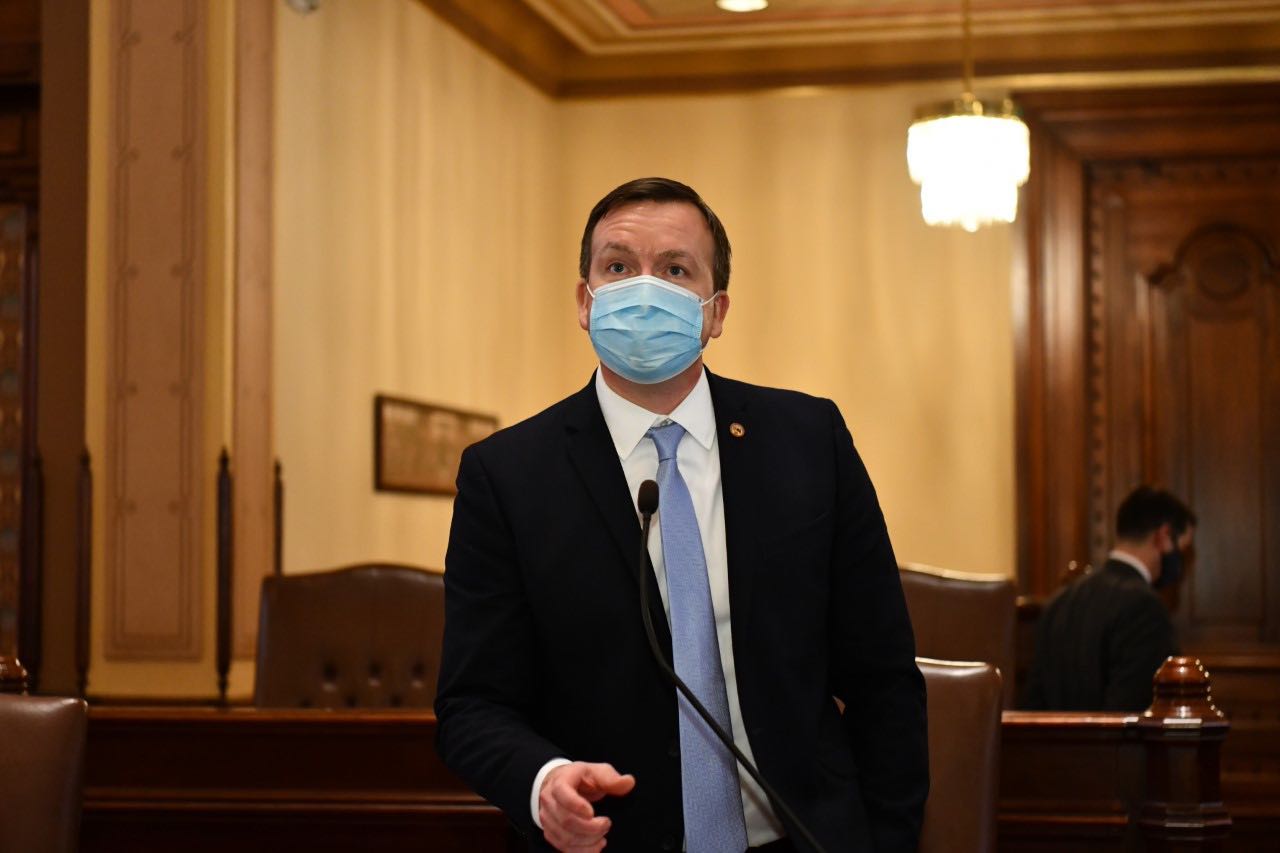 SPRINGFIELD – In light of the state legislature’s passage of a criminal justice reform measure, State Senator Andy Manar (D-Bunker Hill) released the following statement:
SPRINGFIELD – In light of the state legislature’s passage of a criminal justice reform measure, State Senator Andy Manar (D-Bunker Hill) released the following statement:
“Over the past four months, the Illinois Senate has conducted public hearings on specific legislative proposals related to criminal justice reform. Much of the content of the hearings was based on legislation pending before the General Assembly. The first public hearing was held on September 1, 2020. In total, nine public hearings were held, accounting for over 30 hours of public testimony. The work of those hearings was finalized and legislation was filed, reflected first in House Bill 163, with the anticipation that legislative action would be considered by the General Assembly during this past week.
- Details
- Category: Senator Dave Koehler News
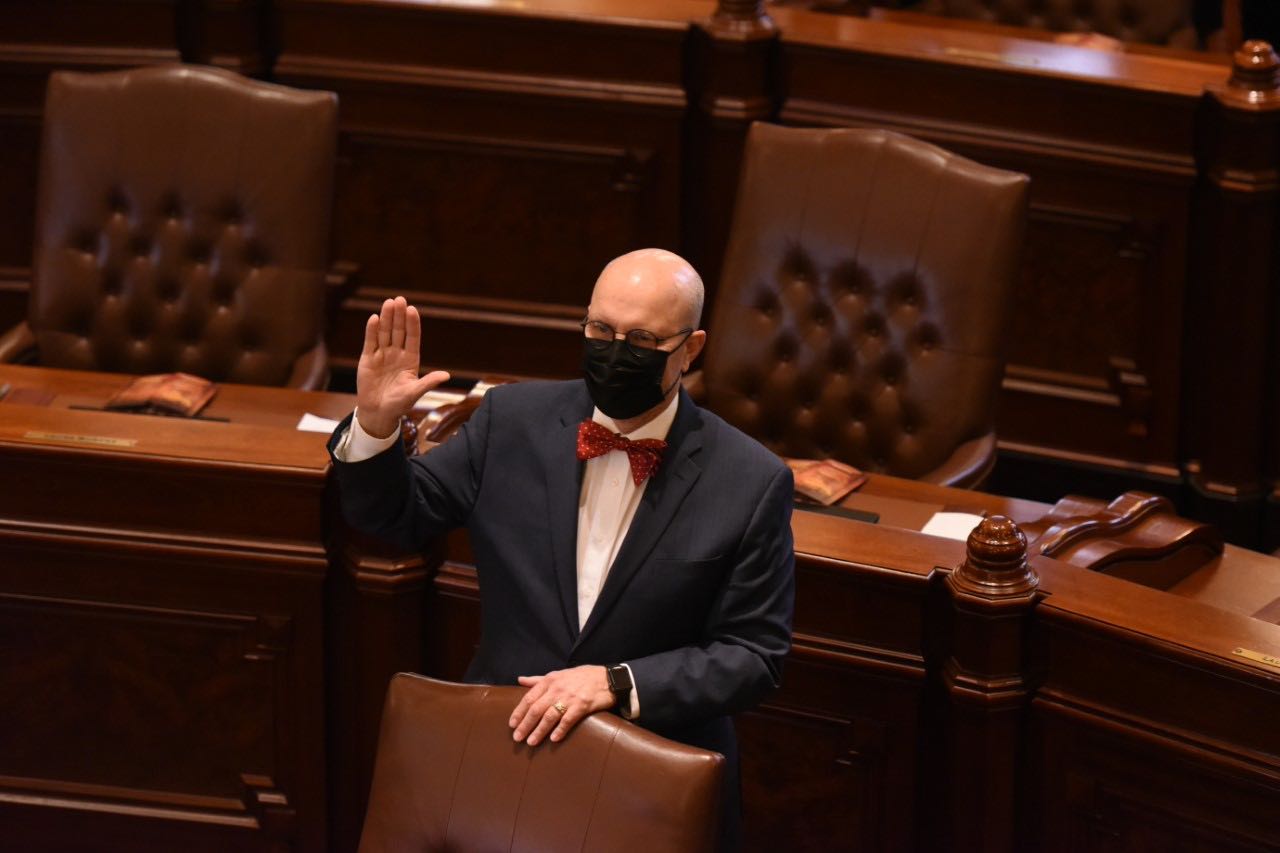 SPRINGFIELD – Providing educators and students with the resources needed to succeed, fighting for quality, affordable health care and ensuring prosperity Downstate remain at the top of State Senator Dave Koehler’s (D-Peoria) legislative agenda.
SPRINGFIELD – Providing educators and students with the resources needed to succeed, fighting for quality, affordable health care and ensuring prosperity Downstate remain at the top of State Senator Dave Koehler’s (D-Peoria) legislative agenda.
Koehler, who was sworn in to his fifth term on Wednesday, is eager to continue working to improve the lives of the people of Central Illinois.
Read more: Koehler inaugurated to serve fifth term in the state Senate
- Details
- Category: Senator Meg Loughran Cappel News
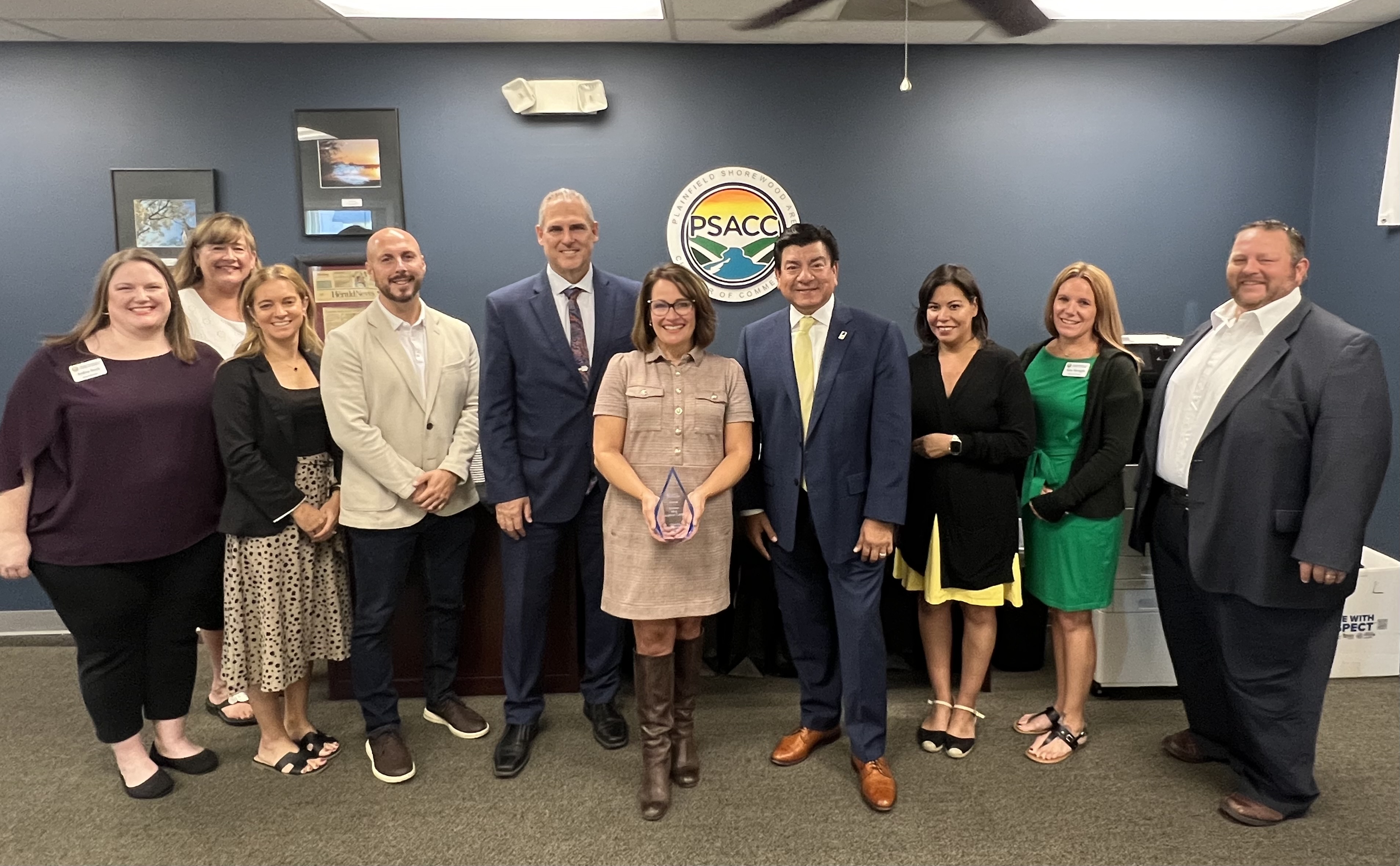
SPRINGFIELD – This week’s lame duck session was a win for students and teachers with the passing of the Black Caucus’s education pillar and legislation restoring collective bargaining rights to Chicago teachers. With her background in education, State Senator Meg Loughran Cappel (D- Shorewood) is especially proud to have been a part of such monumental votes.
“As a mother and former teacher and school board member, I’m proud one of the first votes I cast was to improve our school system for all children,” Loughran Cappel said. “Ensuring every child has the tools they need to success in their education is one of my top priorities.”
Read more: Loughran Cappel: Historic education reform a win for students and teachers
- Details
- Category: Senator Patrick Joyce News
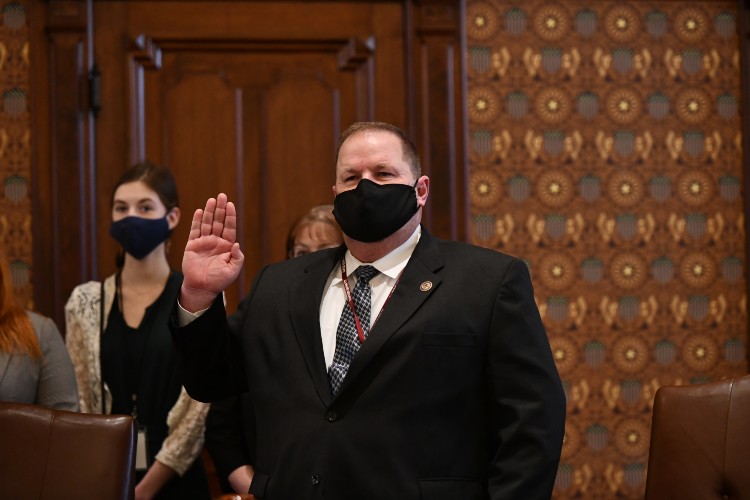 SPRINGFIELD – Increasing access to health care, improving the agriculture industry, and making investments in education are priorities for State Senator Patrick Joyce (D-Essex), who was sworn in today for his first full term in the Illinois Senate.
SPRINGFIELD – Increasing access to health care, improving the agriculture industry, and making investments in education are priorities for State Senator Patrick Joyce (D-Essex), who was sworn in today for his first full term in the Illinois Senate.
“After a difficult year, there is a great deal of work to be done in Springfield to improve the quality of life for everyone in the 40th District,” Joyce said. “I am prepared to meet those challenges head on, and I’m ready to get to work.”
Joyce, a Democrat from Essex, was appointed to the Senate in 2019 and stood for election in November. He represents the 40th District, which includes portions of southland, as well as a majority of Kankakee County, an eastern portion of Will County, and southeastern Grundy County.
His top goals include making the health care system easier to navigate and more supportive for those suffering from serious illness, ensuring that everyone has access to clean and affordable drinking water, and reducing class sizes throughout the state.
Joyce strives to keep everyone updated with the most helpful and accurate information, and encourages people to reach out to his office at 708-756-0882 or via his website with questions and concerns.
This week marks the start of the 102nd General Assembly.
- Details
- Category: Senator Celina Villanueva News
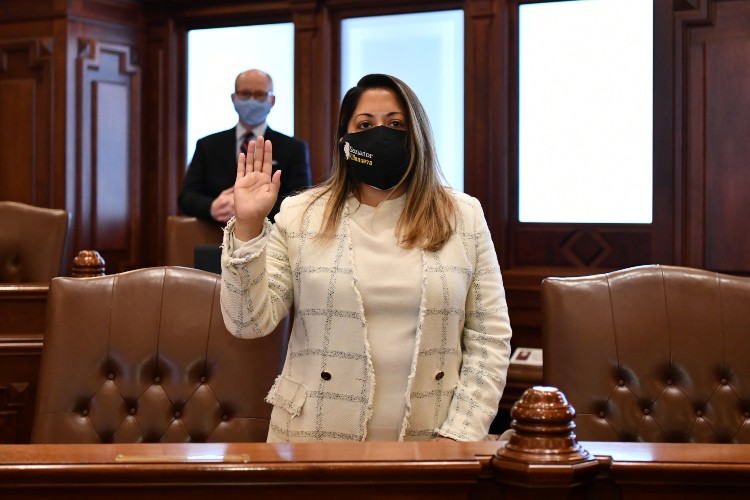 SPRINGFIELD – State Senator Celina Villanueva (D-Chicago) was sworn in to continue representing the 11th State Senate District of Illinois on Wednesday.
SPRINGFIELD – State Senator Celina Villanueva (D-Chicago) was sworn in to continue representing the 11th State Senate District of Illinois on Wednesday.
“I am honored to have the trust and support of my community,” Villanueva said. “When I go to Springfield, I bring the voices of my community with me knowing that we are stronger when we fight for justice together.”
Senator Villanueva first joined the Illinois Senate in 2020, previously serving in the Illinois House of Representatives since 2018. Before holding elected office, Villanueva was an organizer for the Illinois Coalition of Immigrant and Refugee Rights (ICIRR) and Chicago Votes.
Several ZIP codes in the 11th State Senate District have the highest infection rates of COVID-19 in the state, compounding on already existing health and economic disparities in communities of color. Holistically addressing the disparities highlighted by the pandemic remains her first priority as lawmakers enter the 102nd General Assembly.
“The pandemic has further highlighted what communities of color have faced for generations,” Villanueva said. “We won’t accept going back to how things were pre-pandemic. We must build our communities back stronger and more resilient.”
- Details
- Category: Senator Laura Murphy News
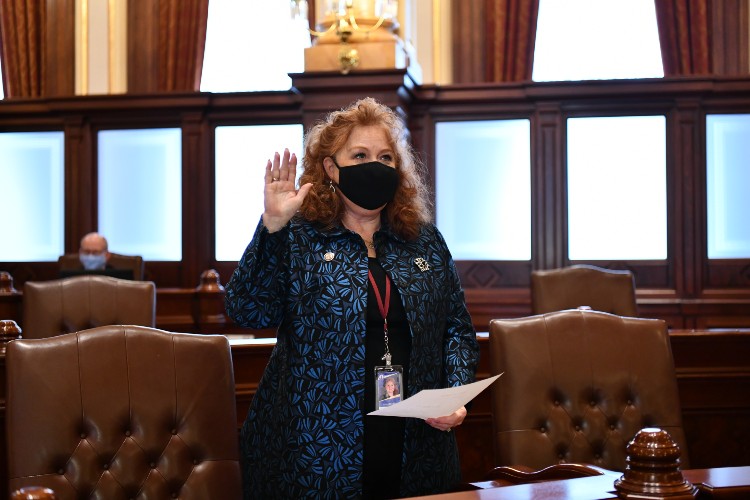 SPRINGFIELD – Improving the state’s educational resources, restoring the public’s trust in government and fighting for middle-class families remain priorities for State Senator Laura Murphy (D-Des Plaines), who was sworn in to her second full term Wednesday, Jan. 13 at the Capitol.
SPRINGFIELD – Improving the state’s educational resources, restoring the public’s trust in government and fighting for middle-class families remain priorities for State Senator Laura Murphy (D-Des Plaines), who was sworn in to her second full term Wednesday, Jan. 13 at the Capitol.
“I’m honored to have the confidence of the people of the 28th District, and I pledge to continue representing them faithfully in the Illinois Senate,” Murphy said. “Over the past five years, I’ve made it my mission to push for government transparency and accountability, affordable education for all, and better support for working families in Illinois—and I have no plans to slow down.”
Murphy was appointed to the Illinois State Senate in 2015 and stood for election in 2016 and 2020. The 28th Senate District neighbors O’Hare International Airport and includes all or parts of Arlington Heights, Des Plaines, Elk Grove Village, Hanover Park, Hoffman Estates, Mount Prospect, Park Ridge, Rolling Meadows, Roselle and Schaumburg.
In 2020, she was appointed Deputy Majority Leader of the Senate.
“Working in the General Assembly means engaging in conversations and negotiations with my fellow lawmakers to come up with solutions we can all stand behind,” Murphy said. “I’m thrilled to have the opportunity to continue this work and make sure the Illinois government is truly serving the people of this great state.”
- Details
- Category: Senator Cristina Castro News
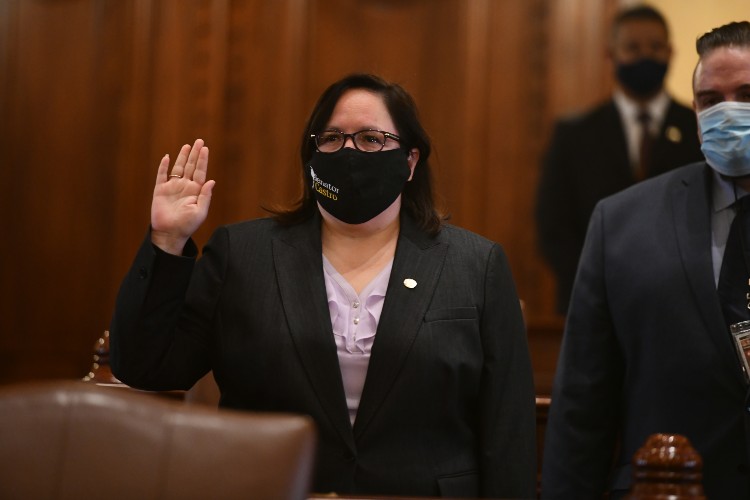 SPRINGFIELD – State Senator Cristina Castro (D-Elgin) and several other members of the Illinois Senate were sworn in as the 102nd General Assembly began earlier today. Castro’s inauguration marks the start of her second term.
SPRINGFIELD – State Senator Cristina Castro (D-Elgin) and several other members of the Illinois Senate were sworn in as the 102nd General Assembly began earlier today. Castro’s inauguration marks the start of her second term.
“I was very proud of all the good my colleagues and I were able to accomplish during my first term, and I am both honored and humbled that the people I represented trusted me enough to continue that work for another General Assembly,” Castro said. “There is still a lot of work that needs to be done, particularly to address the effects of the COVID-19 pandemic, and I am eager to begin the conversations with my fellow lawmakers to make Illinois a better place to live.”
Castro was first elected to the Senate in Nov. 2016 for a four-year term. Her current term, along with the terms of entire 102nd General Assembly, expires Jan. 11, 2023.
- Details
- Category: Senator Robert Peters News
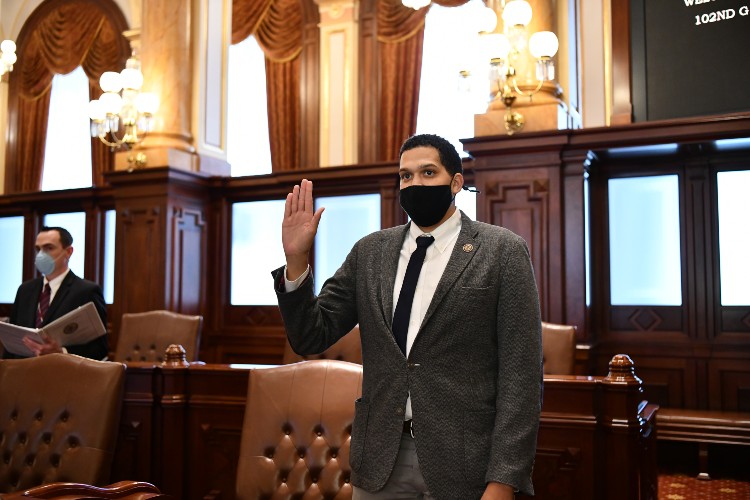 SPRINGFIELD – State Senator Robert Peters (D-Chicago) was sworn into his first full term in office today as the 102nd General Assembly officially began.
SPRINGFIELD – State Senator Robert Peters (D-Chicago) was sworn into his first full term in office today as the 102nd General Assembly officially began.
“This has been a trying year for many of us, so I do not take for granted the responsibility given to me by the people that I represent to look out for their best interests,” Peters said. “We are at a crossroads in our society, and I am confident that the 102nd General Assembly will be able to deliver real safety and justice to our communities and establish a world where everyone can be made whole.”
Peters joined the Senate in Jan. 2019, following the resignation of Sen. Kwame Raoul, who had been elected to serve as Attorney General the previous November.
The 102nd General Assembly serves until Jan. 11, 2023.
More Articles …
- Feigenholtz takes Oath of Office for 102nd General Assembly
- Sims' criminal justice reform passes Illinois General Assembly
- Illinois Black Caucus takes first-in-the-nation step to eliminate systemic racism
- Belt: When we break down barriers to economic access, equity and opportunity, the whole state benefits
Page 577 of 769













 © 2026 Illinois Senate Democratic Caucus
© 2026 Illinois Senate Democratic Caucus